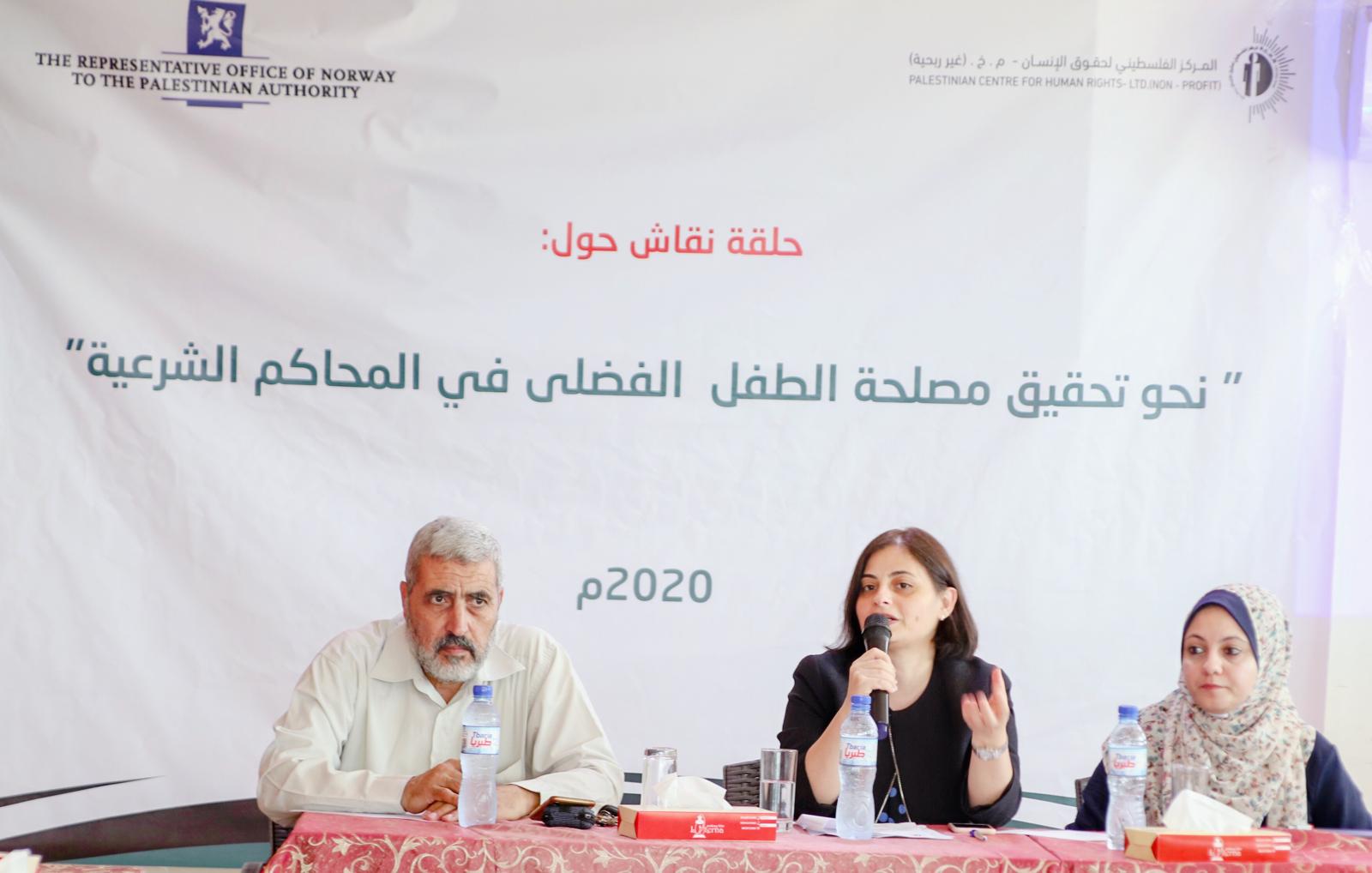
REF: 34/2020Date: 29 July 2020
On Wednesday, 29 July 2020, the Women’s Rights Unit at the Palestinian Centre for Human Rights (PCHR) organized a panel discussion titled: “Sharia Courts for the Best Interest of Children.” The panel discussion was held at Laterna Restaurant hall, north of Gaza City, and was attended by Dr. Sa’id Abu al-Jabeen, Sharia’ Supreme Court Judge, representatives of women institutions and civil society organizations (CSOs), and specialized Sharia lawyers.
Mona al-Shawa, Head of PCHR’s WRU, opened the meeting by welcoming the attendees and pointed out that this meeting is not the first of its kind with the Higher Sharia Court Council, as PCHR previously held a workshop on the “2004 Palestinian Child Law and Aligning it with Personal Status Law,” which provided many valuable recommendations, the most prominent of which was the submission of a legal memorandum signed by 40 CSOs, HROs and activists, which demanded equality between widowed and divorced women in terms of child custody and focusing on the child’s best interests.
Al-Shawa clarified that this workshop comes within a series of workshops that will be held by WRU across the Gaza Strip’s governorates. She added that the workshop aims at discussing the best interests of the child regarding custody, hosting and visitation guaranteed by the Palestinian Child Rights Law as well as the International Convention on the Rights of the Child No. 260 of 1990; primarily two fundamental rights: the right to take the child’s opinion in the judicial proceedings affecting their life, and the right to protect children through the Child Protection Department that assesses the status and follows up on children cases as per the law and regulations.
Aya al-Wakil, WRU lawyer, presented the most important legal articles in the Palestinian Child Law in order to achieve the principle of equality and non-discrimination between children, male and female, in the cases of custody, hosting and visitation and to equalize between the widowed and divorced women in terms of child custody.
Al-Wakil stressed the need to offer the child with a choice in terms of custody when they reach puberty in order to achieve the principle of equality and non-discrimination between males and females and pursuant to the law stipulation that the child’s opinion should be taken in the judicial procedures related to their circumstances.
Dr. Saeed Abu al-Jubeen, a Supreme Sharia Court judge, thanked PCHR for its effective role, stressing the importance of holding such meetings on a regular basis. Abu al-Jubeen also called for the need to strengthen cooperation and networking between the Sharia’ Judiciary and civil society organizations to ensure a decent life for children and to find solutions to activate the Palestinian Child Law and to take into account the best interests of the child in the Shariah courts; and to eliminate contradiction between legal articles that conflict with this law by amending laws to suit the best interests of the child. Abu al-Jubeen pointed out that there are many laws under review by the Technical Office at the Sharia Court.
Abu al-Jubeen also spoke about viewing and hosting cases and the need to speed the decision process in order not to prolong the litigation period between opponents. He added that there is an amendment to some generalizations that conflict with the child’s interest in addition to eliminating the conflict in these generalizations. Abu al-Jubeen talked about the custody cases and pointed out to the efforts made by human rights and women’s organizations to ensure equality between divorced women and widows regarding custody, which is under study, according to him.
At the end of the meeting, the participants praised PCHR for holding this meeting, calling for holding more meetings that allow them to submit their recommendations to Sharia courts in cases relevant to women and children’s rights and the hindrances facing them during their work. They also called for setting mechanisms to resolve them.
The panel discussion concluded with a number of recommendations: